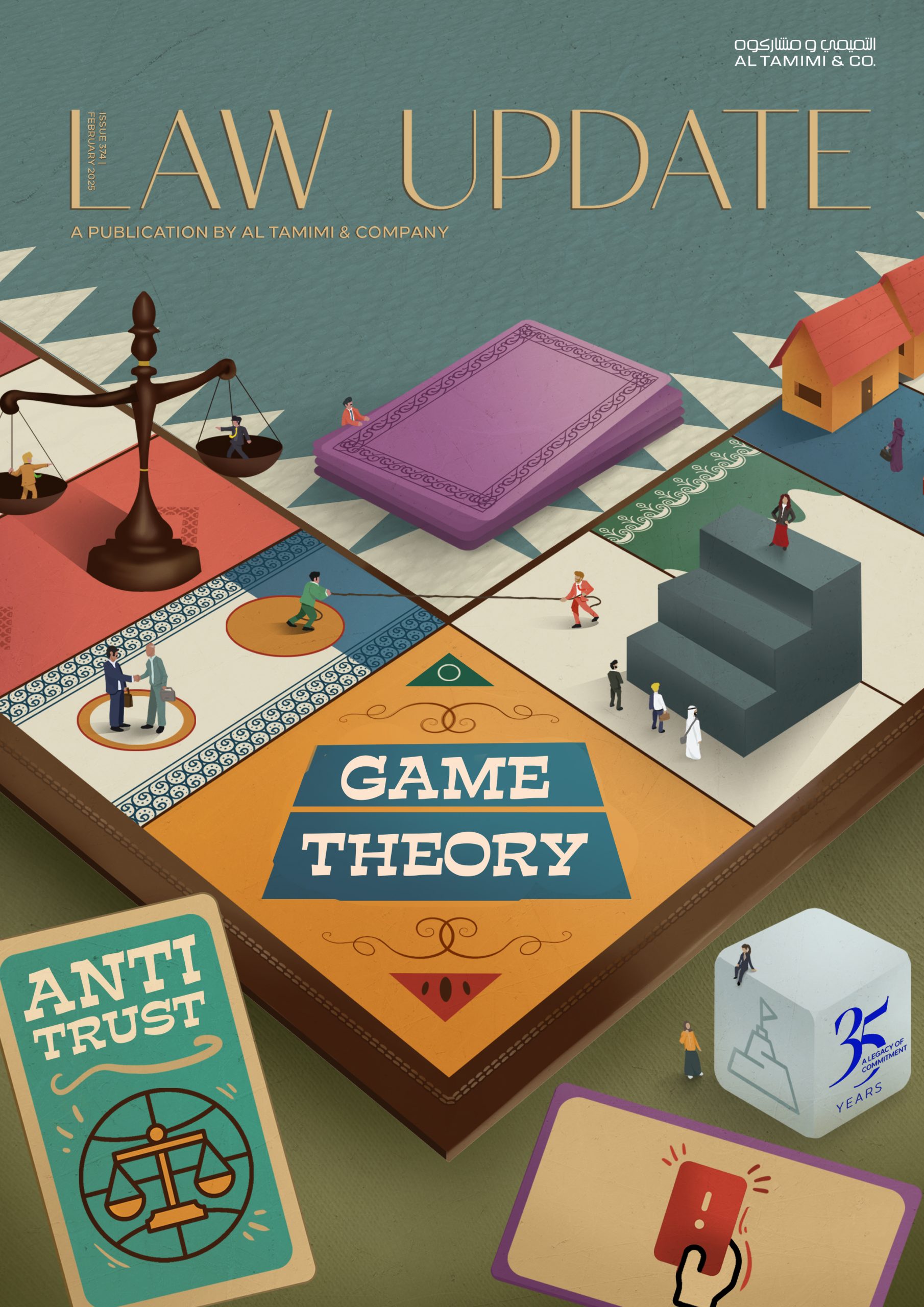- Arbitration
- Banking & Finance
- Capital Markets
- Commercial
- Competition
- Construction & Infrastructure
- Corporate / Mergers & Acquisitions
- Corporate Services
- Corporate Structuring
- Digital & Data
- Dispute Resolution
- Employment & Incentives
- Family Business & Private Wealth
- Innovation, Patents & Industrial Property (3IP)
- Insurance
Find a Lawyer
Book an appointment with us, or search the directory to find the right lawyer for you directly through the app.
Find out more
Game Theory


2025 is set to be a game-changer for the MENA region, with legal and regulatory shifts from 2024 continuing to reshape its economic landscape. Saudi Arabia, the UAE, Egypt, Iraq, Qatar, and Bahrain are all implementing groundbreaking reforms in sustainable financing, investment laws, labor regulations, and dispute resolution. As the region positions itself for deeper global integration, businesses must adapt to a rapidly evolving legal environment.
Our Eyes on 2025 publication provides essential insights and practical guidance on the key legal updates shaping the year ahead—equipping you with the knowledge to stay ahead in this dynamic market.
The leading law firm in the Middle East & North Africa region.
A complete spectrum of legal services across jurisdictions in the Middle East & North Africa.
-
Practices
- All Practices
- Banking & Finance
- Capital Markets
- Commercial
- Competition
- Construction & Infrastructure
- Corporate / Mergers & Acquisitions
- Corporate Services
- Corporate Structuring
-
Sectors
-
Country Groups
-
Client Solutions
Today's news and tomorrow's trends from around the region.
17 offices across the Middle East & North Africa.
Our Services
 Back
Back
-
Practices
- All Practices
- Banking & Finance
- Capital Markets
- Commercial
- Competition
- Construction & Infrastructure
- Corporate / Mergers & Acquisitions
- Corporate Services
- Corporate Structuring
- Digital & Data
- Dispute Resolution
- Employment & Incentives
- Family Business & Private Wealth
- Innovation, Patents & Industrial Property (3IP)
- Insurance
- Intellectual Property
- Legislative Drafting
- Private Client Services
- Private Equity
- Private Notary
- Projects
- Real Estate
- Regulatory
- Tax
- Turnaround, Restructuring & Insolvency
- White Collar Crime & Investigations
-
Sectors
-
Country Groups
-
Client Solutions
- Law Firm
- /
- Insights
- /
- Law Update
- /
- November 2016
- /
- The Res Judicata Effect of an Arbitral Award in Dubai
The Res Judicata Effect of an Arbitral Award in Dubai
Zane Anani
Robert Karrar-Lewsley
The Facts of the Case
The Claimant entered into a contract with the Respondent for the supply of work.
The contract contained an ambiguous arbitration clause that did not specify a method for appointing the Tribunal, nor the appointing authority. When a dispute arose between the parties over the outstanding debt, the Claimant approached the Dubai International Arbitration Centre (DIAC) to appoint an arbitrator. The dispute was heard by the arbitrator and an arbitral award was issued disposing of the dispute.
Following the issuance of the arbitral award, the Respondent filed Civil Action No. 652 of 2012 to set it aside while the Claimant filed Civil Action No. 584 of 2012 to confirm the award. The Respondent also filed a claim (Commercial Action No. 597-2013) before the Dubai Courts for the appointment of an arbitrator, on the basis that the previous award was invalid and it was for the court to appoint the tribunal, not DIAC. The Claimant argued that this action was beyond the limits of the courts’ jurisdiction as the dispute had previously been determined by the arbitral award.
Court of First Instance
The Court of First Instance dismissed the Respondent’s application for an arbitrator to be appointed because an arbitral award existed that had already resolved the dispute matter.
Court of Appeal
The Court of Appeal upheld the decision of the Court of First Instance.
Court of Cassation
The Court of Cassation upheld the decision of the Court of Appeal.
The Court explained that it was well established by the Court of Cassation that arbitral awards become res judicata upon issuance, although their enforcement is subject to a confirmation procedure. The parties therefore have no recourse to the courts to resolve the dispute once the award has been issued. This is so even if there is new factual evidence or legal arguments.
In issuing the award, the arbitrator disposes of the issues pursuant to the arbitration clause. The purpose of the arbitration clause is therefore fulfilled irrespective of whether the court then proceeds to confirm the award or set it aside for any reason (including a procedural one). The dispute cannot be brought before the same arbitrator or a different one except in accordance with a new agreement between the parties.
An arbitral award does not have res judicata effect only upon confirmation by a final and conclusive decision of the competent court. The situation is similar to the way that court rulings have res judicata effect even if challenged by way of an appeal to the Court of Cassation.
As to the contention that DIAC was not competent to appoint the Tribunal, this was rejected because the Respondent had acknowledged and agreed to DIAC arbitration. The action to set aside the arbitral award was dismissed on this basis.
Comment
This judgment is important because it puts beyond doubt that arbitral awards have res judicata effect once issued, and that this remains the case even if the award is being challenged in the courts. The idea that an award is in some sense temporary or without effect until upheld by the local courts is wrong. Those that use arbitration can have confidence that once issued an award is effective, and that unless the award is annulled the issues that it resolves cannot be re-argued, even if new evidence or arguments arise.
Stay updated
To learn more about our services and get the latest legal insights from across the Middle East and North Africa region, click on the link below.


